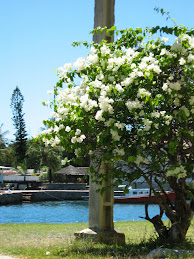
What did you do last Friday? Well, since that was a rhetorical question and this is my blog, I'll tell you what I did. I went to Fiji. But before I get into telling you what I did over there, I think it is appropriate to tell you a little about my family's history regarding Fiji and our previous experiences over there.
I've been travelling over to Fiji regularly my entire childhood. My dad bought free-hold (that means he owns it completely and legally, it isn't leased, like the majority of the land over there) land over there in 1997, and built a house over there in '98. Now don't start thinking about flash houses with pools and unnecessary rooms; this was a farm house. The 25 acres of land is for our business Mahevu Farm.
(Just so you know Mahevu means 'newly occupied land' in Tongan', ironic enough for you?)
The correct word is probably orchid, because we grow noni trees.
Noni is a traditional Pacific medicine. What we do (well, mostly my dad and workers) is pick the fruit and put it into tanks to ferment. It decomposes and turns into a juice, like wine. It isn't sweet or nice-tasting at all, but it is really good for you. We also dry and mill the leaves for powders and teas, which taste a little nicer. Noni has been scientifically tested, and from that little technical details that I know, it aids and stimulates the release of endorphins (the chemical that makes you happy). It also helps with severe illnesses, and while it hasn't been proven to cure cancer, one of our customers who had cancer, started drinking noni, and they lived past their life expectancy by six months, and their quality of life was much improved.
Anyhow, during the military coup of 2006 our house was burnt down in an arson attack.
My father had started brewing beer in the house to save money. He always supplied his workers with a 'cold one' at the end of a long, arduous dayin the hills and this was a lot more cost-effective. The men from the local village were aware of this.
Before I carry on I think I will just say that Fiji is a hard place to live. It's environment and culture can often been cruel, and it's a very 'take what you can get' lifestyle a lot of the time. Those of you who have been fortunate enough to have been there might have experienced locals trying to 'rip you off', or people begging in the street. It's well known that they can see tourists as people they'll never see again, so try and get whatever they can from them. I can totally understand this, and it makes me sad that they have to be driven to it. For example, my mother witnessed beggars in the streets of the city poking their babies with pins so they would cry, and passers-by would feel more sorry for them, so, hopefully, they could reap a greater profit. I asked my dad last week if he considered Fiji a developing country. He answered, 'I think it's a third world country.'
They broke into the house. 'They' being men my father had employed and paid well through Fiji's incessant job draught. 'They' being men who had held me as a young girl, who I had talked and joked with, eaten beside. They broke into the house and held a party up at the hill. Then they spent four days clearing the house of all the furniture and equipment. I'm sure they left the family photos on the wall. Then one of them lit a match.
The house burnt to the ground.
On December 11th 2006 the house on the hill was no more.
Why would they do such a thing? As far as I know, it's to do with a grudge as old as my dad's time in Fiji. The local villagers were sure that one of their men would become my dad's partner, but when he chose someone from a different village, they were not impressed. Nothing was mentioned, but it obviously wasn't forgotten.
My dad is no ordinary man. He took the news hard, he is human, after all, but he didn't give up.
He would not, and could not, let them get to him.
One month after the flames had licked the walls of our house, and the windows had smashed, and smoke had billowed into the sky, the beginnings of a castle were standing tall on top of the hill.
Soon after, Mahevu Fortress dominated the the land. A sign nailed to a palm tree at the gate reads, BulaMoce Farm, or Hello-Goodbye Farm.
My father had built a castle out of pre-cast concrete. Complete with twelve foot high walls made of six inch thick cement, castellation features, and a Fijian flag, flying proudly.
Majestic. Amazing. A symbol of perseverance. An image that almost demands reverence.
Built to last a thousand years.
And definitely inflammable.


No comments:
Post a Comment